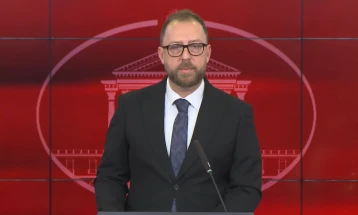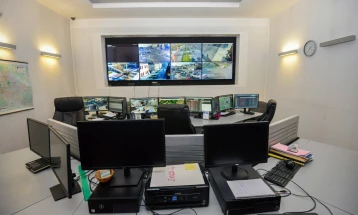EIB’s Pavlova: Companies should focus on digitalization and green economy

Skopje, 15 September 2021 (MIA) – It takes a lot of support, especially for small and medium-sized companies, to avoid closing businesses and losing jobs, and to help them strengthen their capacities and adapt to the new conditions caused by the pandemic, says the Vice-President of the European Investment Bank, Lilyana Pavlova, in an interview with MIA.
Pavlova believes that companies should focus on digitalization and transferring towards a green economy. The application of energy efficient measures isn’t widespread across the Western Balkans, Pavlova says, because 2/3 of companies don’t view these measures as a priority.
“Our analysis shows that the pandemic’s influence on the private sector was devastating, forcing 40% of companies in North Macedonia to close temporarily during the pandemic. Small and medium-sized enterprises (SMEs) were hit the hardest, and they now need further support for two reasons: to prevent their closure and layoffs on the one hand, and to help them strengthen their capacities and adapt to the new conditions caused by the pandemic and climate change. This adaptation will need to focus on digitalization and the implementation of energy efficient practices. The application of such measures is not widespread throughout the Western Balkans because 2/3 of companies don’t think of these measures as profitable, despite the fact that many companies think of them as profitable according to the EIB’s Enterprise Survey,” Pavlova says in the interview which can be read below in full.
She says that the implementation of key economic and structural reforms in this country will be crucial to create a good business climate.
Pavlova says that North Macedonia is already on the right track, and its good condition, above the regional average, has been confirmed in the latest edition of the Worldwide Governance Indicators. It takes further progress to get the institutional framework closer to EU standards, to improve political stabilities and investment management practices.
Pavlova was interviewed by MIA after her visit to Skopje, where she attended the First Annual Conference organized by the Ministry of Finance. The interview can be read in full below:
Mrs. Pavlova, you visited Skopje, where you attended the First Annual Conference organized by the Ministry of Finance. What are your expectations for the Macedonian economy? Is it safe to say that it’s slowly recovering from the Covid-19 crisis?
Due to the pandemic, the GDP went down by 4.5% in 2020 because investments and demand were reduced. However, due to policies, the GDP is expected to recover by 3.8% in 2021, and an additional 4% in 2022, according to the International Monetary Fund (IMF)’s prognosis. The public debt’s relation in terms of the GDP was 51.3% in 2020, and it’s expected to go above 55% in 2022. The extremely high deficit in 2020 resulted in the shortening in GDP and the expansive fiscal policy to mitigate the pandemic’s negative influence. On the plus side, public financial management has been getting better over the last few years.
We can say that the measures helped relieve the most urgent consequences of Covid-10, but the pandemic significantly slowed down North Macedonia’s economic progress, which had started to show upward tendencies in many areas. The country made significant progress in its economic reforms and is one of the most integrated ones in the global value chain among EU countries. Its strong capacity for innovations showed this, and these areas need to be further strengthened.
The recently published report for credit activity by the EIB shows that credit demand has continued to go down in North Macedonia over the past six months due to the pandemic, whereas the quality of credit applications has declined. The credit supply conditions have become stricter over the past six months, which is similar to what the rest of the region is doing, but they’re expected to get stricter over the next six months, which differs from the region.
On the plus side, the same survey shows that North Macedonia has made quick progress in response to the pandemic. Almost 90% of banks sped up their internal processes and client reach, whereas 30% adapted and automated their risk management and branch structures.
As I’ve said to PM Zaev and Minister of Finance Besimi during my meetings with them in Skopje, the EIB will fully support North Macedonia in order to recover faster from Covid, and to motivate economic and social development primarily through digitalization. We’re ready to secure consulting services and funding to structure financial instruments that benefit the private sector, in order to improve the competitiveness of the economy in North Macedonia.
Since the beginning of the crisis, the government of North Macedonia has undertaken a series of measures to support the economy and the citizens. Will further support of the business sector be necessary, given that the restrictive measures to stop the spread of the virus are still active? If yes, what sectors should it focus on?
Our analysis shows that the pandemic’s influence on the private sector was devastating, forcing 40% of companies in North Macedonia to close temporarily during the pandemic. Small and medium-sized companies were hit the hardest, and they now need further support for two reasons: to prevent their closure and layoffs on the one hand, and to help them strengthen their capacities and adapt to the new conditions caused by the pandemic and climate change. This adaptation will need to focus on digitalization and the implementation of energy efficient practices. The application of such measures is not widespread throughout the Western Balkans because 2/3 of companies don’t think of these measures as profitable, despite the fact that many companies think of them as profitable according to the EIB’s Enterprise Survey.
The EIB has already signed the first investments to improve the digital capacities in the Serbian small and medium-sized enterprises in 2020 and 2021, and we will support the implementation of ecologically responsible practices in companies in Montenegro. We’re planning to implement such projects in the region and encourage the economic transformation towards increased resistance of the regional market, which is expected to relieve its integration in the distributive and production lines of the EU.
While in Skopje, I was able to meet with the Board of Directors of the Bank for Development of North Macedonia, headed by Kire Naumov and Faruk Ismaili. Our institutions have cooperated for decades in order to support the funding of small and medium-sized enterprises in the country. We’re proud to continue working alongside our long-term partner, Development Bank of North Macedonia (DBNM), in order to support the development and sustainability of the private sector and the banking industry of North Macedonia in conditions of an ongoing crisis, in this case Covid-19. After our successful cooperation, the EIB is impatiently awaiting to join the efforts of increasing the resistance and competitiveness of SMEs through green and digital investments.
The EIB has approved a EUR 100 million credit line for the country, meant for economic recovery of SMEs. In your latest interview with MIA, you stated you expect at least 300 projects of small and medium-sized enterprises to be backed. How many projects have been backed so far?
The funds will be distributed soon, the first payment tranche is expected over the upcoming few weeks. The DBNM is working with commercial banks for quick payment of these funds to local businesses in order to help their liquidity and needs for work capital, job preservation and their growth and adaptation.
The new credit line is planned as a way to support the economic healing of small and medium-sized enterprises when they need it most. The access to funds remains one of the biggest problems for SMEs because they see high interest rates as the biggest obstacle when applying for loans, as we can see in our latest Enterprise Survey. The EIB’s new funding of EUR 100 million will be available under very favorable and flexible conditions, with low interest rates and extended final maturity in order to cover a wide array of companies from various industries that were hit the hardest.
You said the EIB supports green economy. Are there any concrete plans in terms of this? How much money does the EIB plan to invest in the Western Balkans?
The two immense threats imposed by Covid-19 and climate change are motivation for us to change the existing economic paradigm and move towards a new society based on the principles of sustainability and equality. The economy needs to lead the road to transformation and turn it into a green, sustainable model, applying it in every sector, starting from transport, energy, the industry, agriculture and environmental protection.
We’re already working on projects in all of these sectors throughout the region, and they’re all in varying states of implementation. What I’m mentioning is an initiative to support the region in its efforts to stop using coal and start using a more efficient, secure and diverse energy mix. Weaning off coal will help mitigate one of the most serious ecological issues the region has been facing for decades – air pollution. The EIB has already signed a new construction loan to make a gas interconnector between Serbia and Bulgaria, and we’re working on the preparation of such a project for North Macedonia.
The EIB is also working on sustainable mobility projects, such as the reconstruction of the railroad network of Corridor VIII in North Macedonia, as well as the improvement of water navigation down the rivers Sava and Danube in Serbia, as well as to modernize urban transport in the Sarajevo Canton. We will sign new projects in North Macedonia related to water supply and waste water infrastructures.
We talked to PM Zaev about digitalization, diversification of energy, transitioning towards renewable energy sources, development of municipal infrastructure, projects for water and waste waters, climate resistance support, mitigation and climate action, as the main areas for future support and investments in North Macedonia.
We’re ready to secure financial and technical consulting for such purposes, to help the countries of the region have the most profits from the available Economic and Investment Plan funds, keeping in mind their strategies for long-term sustainability and national strategies.
The European Commission has adopted the Economic Investment Plan. As a representative of an international financial institution, what would you say to North Macedonia’s government and the business sector to help them use more funds for economic renewal?
Truly, this plan is a bouncing-off point for faster regional development, economic transformation and coordination with EU standards. Specifically, it lists the key strategic projects in the areas for sustainable transport, green and digital transition, the creation of a common market and inclusive growth that will be backed up by around EUR 30 billion.
As a bank of the EU, we will help with the implementation of this plan on a financial and technical level, by securing our project preparation, implementation and supervision expertise, alongside the European Commission and under the Western Balkans Investment Framework.
As far as North Macedonia goes, the implementation of key economic and structural reforms will be crucial for the creation of a favorable business climate. The country is on the right track and its good condition, above the regional average, has been confirmed in the latest edition of the Worldwide Governance Indicators. It takes further progress to get the institutional framework closer to EU standards, to improve political stabilities and investment management practices.
During my meeting with PM Zaev in Skopje, I confirmed our dedication to a further contribution towards the country’s economic competitiveness, as well as its transition towards a greener, more sustainable economic model. We expect to continue our close cooperation with the government, the DBNM, the EU and other financiers in the country, in order to turn the current and future projects into true successes that will benefit the citizens of North Macedonia.
Biljana Anastasova-Kostikj
Translated by Dragana Knezhevikj







